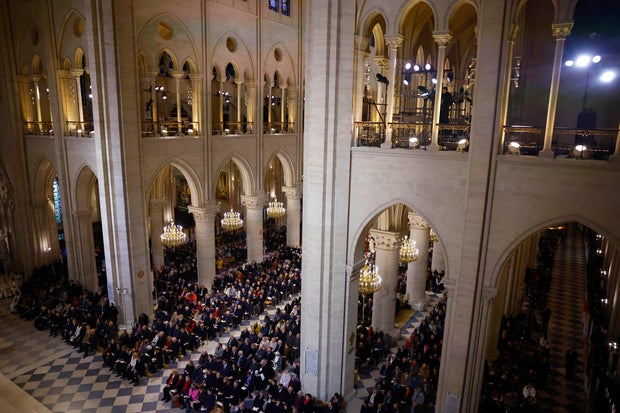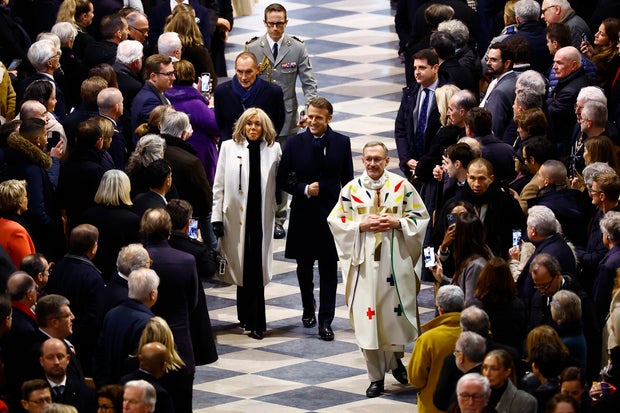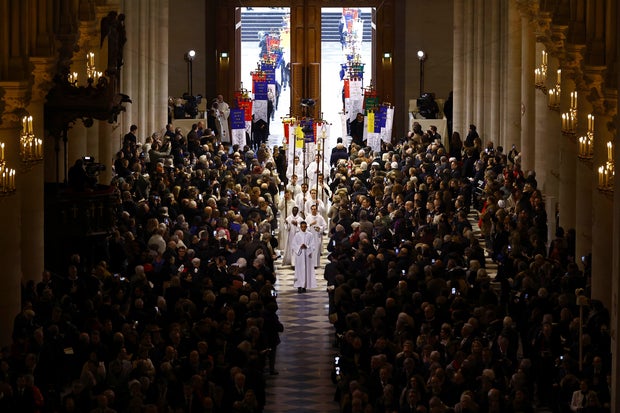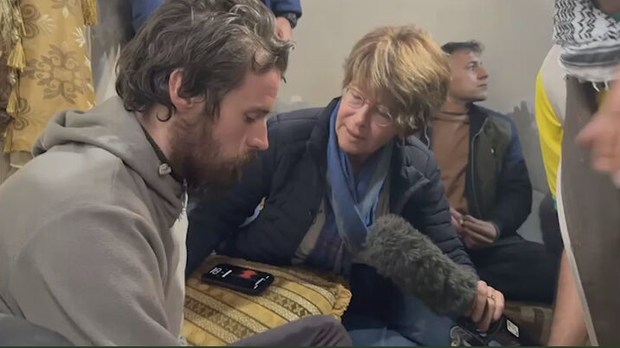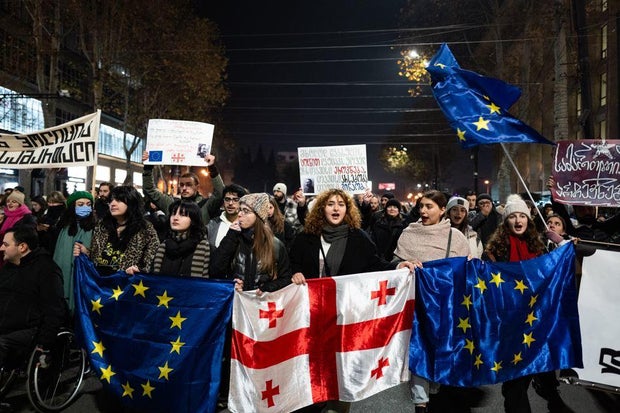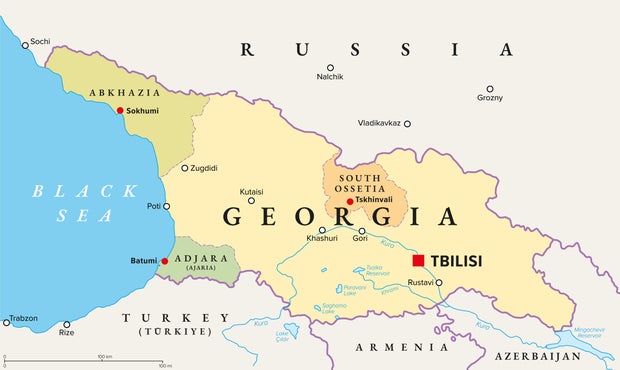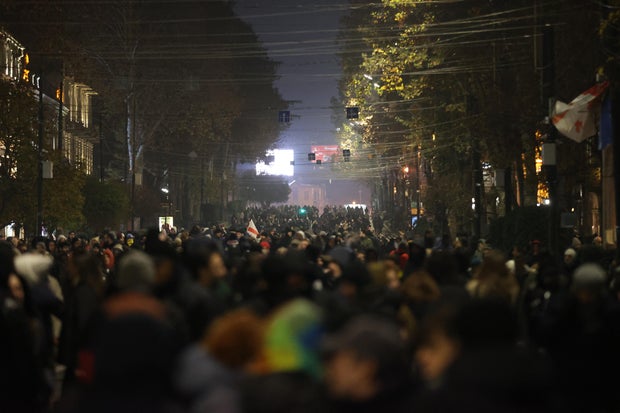CBS News
Notre Dame hosts first Mass since reopening its doors after 2019 fire

Notre Dame Cathedral, its air thick with the smell of incense, on Sunday, hosted its first Mass since the catastrophic fire of 2019, a moment that transcends religious significance to become a powerful symbol of Paris’ resilience.
Beneath the glow of traditional chandeliers and modern spotlights, which illuminated its intricately carved stonework, the cathedral emerged reborn to the faithful, its grandeur restored after more than five years of reconstruction.
For Catholics, it marks the revival of the city’s spiritual heart, a place where faith has been nurtured for centuries. For the world, it signals the rebirth of one of global heritage’s most famous landmarks.
The event was both solemn and historic. Archbishop Laurent Ulrich presided over the morning Mass, including consecrating a new bronze altar.
Sarah Meyssonnier/Pool Photo via AP
The liturgy, attended by French President Emmanuel Macron, clergy, dignitaries, and guests totaling around 2,500 people, was closed to the general public. Nearly 170 bishops from France and around the world took part in the celebration, along with one priest from each of the parishes in the Paris diocese and one priest from each of the seven Eastern-rite Catholic churches, accompanied by worshippers from these communities.
Macron, in line with France’s secular division of state and religion, did not take communion.
It is a milestone in Notre Dame’s journey from ruin to resurrection — a process defined by extraordinary craftsmanship, nearly $1 billion in global donations and an unyielding determination to rebuild what seemed lost.
The 860-year-old cathedral reopened more than five years after a fire devastated the iconic landmark. But a massive effort by dedicated artisans to restore the structure brought it back from the brink. “60 Minutes” took an early look at the repairs one week ahead of Notre Dame’s formal reopening and spoke to some of the people who made it possible.
Despite concerns in the wake of the fire that the craftsmanship required to build the cathedral in the Middle Ages no longer existed in modern times, those who helmed the restoration said the project shone a new light on traditional ways of working in construction.
“What’s great about Notre Dame is its like a school, where we pass skills from generation to generation,” Philippe Villeneuve, the lead architect on the Notre Dame repairs, told “60 Minutes.”
Hank Silver, a traditional carpenter who also worked on the restoration, said the project opened new doors for people in his profession.
“It’s maybe a bit of a controversial point to say, but in many ways, this fire has been a great gift. Not just to me personally, but young people who really otherwise would never know that they could have a career as a traditional carpenter, a stone cutter, mason,” Silver said. “These trades are in the public eye again.”
Later on Sunday, an evening Mass will welcome members of the public who secured reservations last week. The Associated Press learned that tickets for this service were claimed within 25 minutes, underscoring Notre Dame’s enduring ability to inspire awe, devotion, and curiosity.
What’s more extraordinary is that this is taking place in a country with a strong emphasis on secularism and a low rate of church attendance.
Public viewing areas along the Seine on Sunday morning drew hundreds of people who wished to witness the historic moment from afar, although their numbers were likely subdued by rainy and miserably cold weather conditions.
Retired engineer Claude Lancrenon, watching from a viewing area, expressed both awe and disappointment.
“There is so much security,” he said, gesturing toward the barriers. “Yesterday, that seemed appropriate. But today, I had hoped it would be more open so we could approach the cathedral. I still hope we’ll be able to get closer.”
Sarah Meyssonnier/Pool Photo via AP
Tight security — akin to that of the Paris Olympic Games — reflected the importance of the occasion, ensuring the safety of dignitaries and the public alike as the cathedral re-entered its role as a global symbol of unity and resilience.
Nathalie Martino, a retired event organizer visiting Paris to see family, recalled the anguish of watching the cathedral burn.
“I cried so much that day,” she said. “And now, here I am. I had to come. It was something I needed to do.”
Sunday’s Masses follow Saturday evening’s ceremonial reopening in which Ulrich symbolically reopened the cathedral’s massive wooden doors by striking them three times with a crosier crafted from charred beams salvaged from the fire. As the doors swung open, choirs filled the cathedral with song and the cathedral’s great organ — silent since the fire — resounded with majestic melodies.
Inside, the restoration reveals a cathedral transformed with now-gleaming limestone walls cleaned of centuries of grime. The restored stained-glass windows project dazzling patterns of color across the nave.
“No one alive has seen the cathedral like this,” said the Rev. Olivier Ribadeau Dumas, Notre Dame’s rector. “It is more than restored — it is reborn.”
Sunday morning’s liturgy consecrated the new altar, a pivotal moment in Notre Dame’s return to full liturgical life.
The altar houses relics of five saints tied to Paris, including St. Catherine Labouré and St. Charles de Foucauld, continuing a centuries-old tradition of embedding sacred artifacts at the heart of worship spaces. The consecration, involving holy water, chrism oil, incense and prayer, transforms the altar into a sacred centerpiece of the cathedral.
The reopening of Notre Dame is more than a religious milestone, it is a moment of cultural and national unity. Macron, who vowed to restore the cathedral within five years after the fire, attended Saturday’s ceremonies and called the project “a jolt of hope” for France, a nation often divided by political crises.
The Sunday Masses underscore Notre Dame’s dual role as a place of worship and a symbol of communal resilience. They also ensure that members of the broader Catholic community can partake in the cathedral’s spiritual revival.
Sarah Meyssonnier/Pool Photo via AP
“This was not just about restoring a building. It was about restoring the heart of the nation,” Dumas said.
The path to restoration has been fraught with challenges. Lead contamination forced work to pause, and the COVID-19 pandemic added delays. Yet the project, overseen by architect Philippe Villeneuve, has been hailed as a triumph of human ingenuity and collective resolve. Cutting-edge fire prevention systems, including thermal cameras and a misting system, have been installed to safeguard the cathedral’s future.
Villeneuve described the effort as “restoring not just a building but the soul of a nation,” emphasizing the personal and national significance of the work.
With its spire once again piercing the Parisian sky, Notre Dame is poised to reclaim its role as a global beacon of faith and art. The cathedral, which previously welcomed 12 million annual visitors, is expected to draw 15 million in its new chapter.
This monumental revival is not confined to a single day. Ulrich has announced an “octave” of celebrations—eight days of special religious services, each with its own theme, running through Dec. 15. These daily liturgies, open to diverse groups from local parishioners to international pilgrims, emphasize Notre Dame’s role as a unifying spiritual hub.
CBS News
Biden commutes roughly 1,500 sentences and pardons 39 people, most ever in a single day
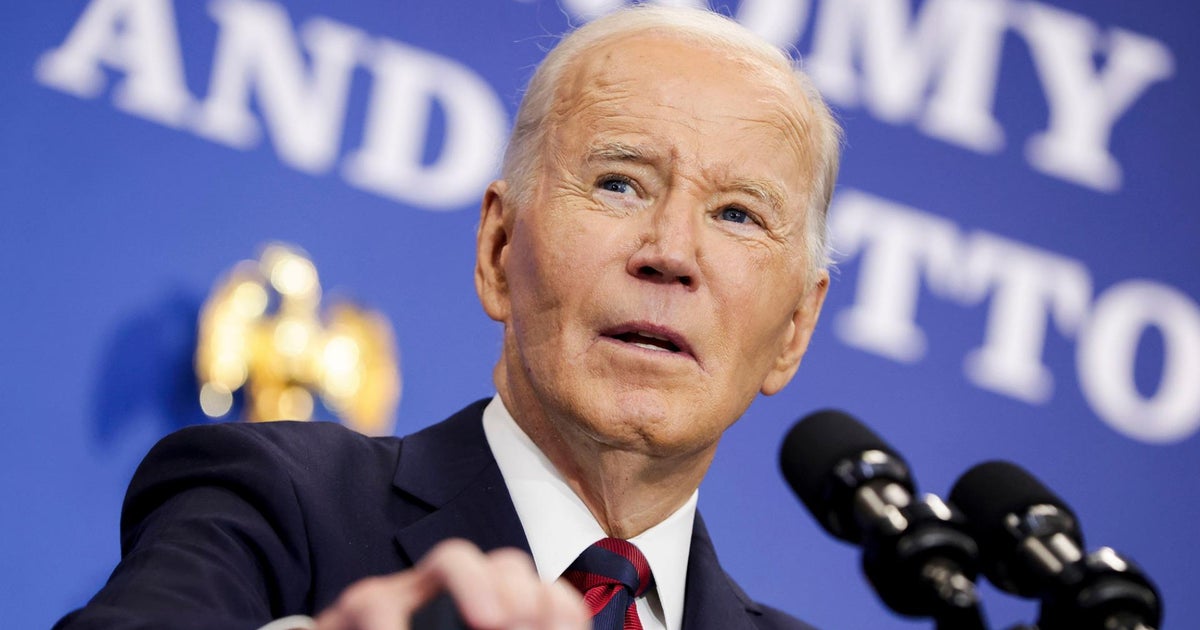
President Joe Biden is commuting the sentences of nearly 1,500 people who were released from prison and placed on home confinement during the coronavirus pandemic and is pardoning 39 Americans convicted of nonviolent crimes. It’s the largest single-day act of clemency in modern history.
The commutations announced Thursday are for people who have served out home confinement sentences for at least one year after they were released. Prisons were uniquely bad for spreading the virus and some inmates were released in part to stop the spread. At one point, 1 in 5 prisoners had COVID-19, according to a tally kept by The Associated Press.
“These actions represent the largest single-day grant of clemency in modern history,” the White House said.
Mr. Biden said he would be taking more steps in the weeks ahead and would continue to review clemency petitions. The second largest single-day act of clemency was by Barack Obama, with 330, shortly before leaving office in 2017.
“America was built on the promise of possibility and second chances,” Mr. Biden said in a statement. “As president, I have the great privilege of extending mercy to people who have demonstrated remorse and rehabilitation, restoring opportunity for Americans to participate in daily life and contribute to their communities, and taking steps to remove sentencing disparities for non-violent offenders, especially those convicted of drug offenses.”
The clemency follows a broad pardon for his son Hunter, who was prosecuted for gun and tax crimes. Mr. Biden is under pressure from advocacy groups to pardon broad swaths of people, including those on federal death row, before the Trump administration takes over in January. He’s also weighing whether to issue preemptive pardons to those who investigated Trump’s effort to overturn the results of the 2020 presidential election and are facing possible retribution when he takes office.
Those pardoned Thursday had been convicted of nonviolent crimes such as drug offenses and turned their lives around, White House lawyers said. They include a woman who led emergency response teams during natural disasters; a church deacon who has worked as an addiction counselor and youth counselor; a doctoral student in molecular biosciences; and a decorated military veteran.
The president had previously issued 122 commutations and 21 other pardons. He’s also broadly pardoned those convicted of use and simple possession of marijuana on federal lands and in the District of Columbia, and pardoned former U.S. service members convicted of violating a now-repealed military ban on consensual gay sex.
Rep. Jim McGovern, D-Mass., and 34 other lawmakers are urging the president to pardon environmental and human rights lawyer Steven Donziger, who was imprisoned or under house arrest for three years because of a contempt of court charge related to his work representing Indigenous farmers in a lawsuit against Chevron.
Others are advocating for Mr. Biden to commute the sentences of federal death row prisoners. His attorney general, Merrick Garland, paused federal executions. Mr. Biden had said on the campaign trail in 2020 that he wanted to end the death penalty but he never did, and now, with Trump coming back into office, it’s likely executions will resume. During his first term, Trump presided over an unprecedented number of federal executions, carried out during the height of the pandemic.
More pardons are coming before Mr. Biden leaves office on Jan. 20, but it’s not clear whether he’ll take action to guard against possible prosecution by Trump, an untested use of the power.
“My administration will continue reviewing clemency petitions to advance equal justice under the law, promote public safety, support rehabilitation and reentry, and provide meaningful second chances,” Mr. Biden said in a statement.
The president has been taking the idea seriously and has been thinking about it for as much as six months – before the presidential election – but has been concerned about the precedent it would set, according to people familiar with the matter who spoke to The Associated Press on condition of anonymity to discuss internal discussions.
But those who received the pardons would have to accept them. New California Sen. Adam Schiff, who was the chairman of the congressional committee that investigated the violent Jan. 6 insurrection, said such a pardon from Mr. Biden would be “unnecessary,” and that the president shouldn’t be spending his waning days in office worrying about this.
A president has the power to both pardon, in which a person is relieved of guilt and punishment, or commute a sentence, which reduces or eliminates the punishment but doesn’t exonerate the wrongdoing. It’s customary for a president to grant mercy at the end of his term, using the power of the office to wipe away records or end prison terms.
Before pardoning his son, Mr. Biden had repeatedly pledged not to do so. He said in a statement explaining his reversal that the prosecution had been poisoned by politics. The decision prompted criminal justice advocates and lawmakers to put additional public pressure on the administration to use that same power for everyday Americans. It wasn’t a very popular move; only about 2 in 10 Americans approved of his decision, according to a poll from The Associated Press-NORC Center for Public Affairs Research.
“The President’s categorical approach to clemency has also inspired leaders across the country to take similar action,” the White House said Thursday. “Over ten states and localities, including Maryland and Massachusetts, have issued categorical clemency for marijuana convictions, impacting hundreds of thousands of people and allowing individuals to move past their convictions and move on with their daily lives.”
CBS News
American man identifying himself as Travis Timmerman found in Syria after being freed from prison

An American man identifying himself as Missouri native Travis Timmerman was found Thursday in Syria after being freed from a prison earlier in the week, when longtime dictator Bashar al-Assad was forced from power by a shock rebel offensive.
Timmerman told CBS News senior foreign correspondent Elizabeth Palmer that he had been trying to make his own way out of the country after walking out of the prison where he’d been held for more than half of a year. He said he was detained upon entering Syria seven months ago after spending a month in neigboring Lebanon.
Timmerman said two men armed with AK-47s broke his prison door down Monday with a hammer.
“My door was busted down, it woke me up,” Timmerman said. “I thought the guards were still there, so I thought the warfare could have been more active than it ended up being… Once we got out, there was no resistance, there was no real fighting.”
CBS News
Timmerman said he left the prison with a large group and started walking away. He said he had been trying to head toward Jordan.
He said he “had a few moments of fear,” when he left the prison, and hadn’t really processed that he was free.
“I still haven’t really thought about that. I’ve been more worried about finding a place to sleep each night since then,” he told CBS News. So I’ve been working, really.”
Timmerman said he hadn’t been afraid to approach people to ask for help or a place to sleep at night on his journey.
“They were coming to me, mostly,” Timmerman said, adding that he’d spoken with his family three weeks ago, through a phone that he had while in prison. He said he had been allowed to use it.
“I’m feeling well. I’ve been fed and I’ve been watered, so I’m feeling well,” Timmerman said.
contributed to this report.
CBS News
Violent protests in Georgia highlight battle over the country’s future. Here’s why it matters.

Live television coverage showed police in the former Soviet republic of Georgia beating and arresting an opposition leader last week during a raid on his party’s offices. The scenes played out on the 10th day of violent clashes in capital city Tbilisi between police and protesters furious about the Georgian president’s decision to put talks on joining the European Union on hold.
The unrest that erupted two weeks ago, after months of public frustration over Georgia’s future, has caused significant casualties and seen more than 400 people arrested.
Over 100 people have been hospitalized with injuries sustained during clashes with riot police, but the protesters continue taking to the streets of Tbilisi by their thousands every night.
Jerome Gilles/NurPhoto/Getty
As the protests continue, there’s concern the political crisis could escalate into more widespread violence, and there’s also concern that a key U.S. partner on the far eastern edge of Europe could shift its political tendencies away from the democratic West and toward Moscow — whether or not its people agree with the move. Below is a look at what led to the unrest, and why the political crisis in the country that straddles Europe and Asia matters to the wider world.
What led to the protests in Georgia?
The protests have been driven largely by what many Georgians see as the governing Georgian Dream party’s increasing authoritarian tendencies. In power since 2012, the ruling party led by billionaire Bidzina Ivanishvili initially promised democratic reforms and closer ties with Europe and the West, including the EU.
Critics argue that over time, the party has shifted toward Russia, undermining many Georgians’ aspirations to see their country join the EU.
The government’s decision to freeze EU accession talks, and before that, to adopt a controversial “foreign agents” bill similar to legislation in Russia, were both seen as clear evidence of that shift to the east by Georgia’s ruling party. There were previous protests over the new law as it went through the approval process, with many fearing it will stifle civil society and media freedom in the country.
The situation deteriorated in November following allegations of voter suppression and election fraud in parliamentary elections. The post-election protests, which grew in size and intensity, were fueled by opposition claims that the government was manipulating the democratic process.
President Salome Zurabishvili, an independent politician, has been among the most vocal critics of the ruling Georgian Dream party over alleged election interference, calling the recent vote a “total fraud.” According to the Reuters news agency, two international polling groups from the U.S. agreed with that assessment, calling the results statistically impossible.
On Dec. 3, the country’s Constitutional Court rejected Zurabishvili’s call to annul the parliamentary election results, further exacerbating the tension on the streets. On the ninth day of the protests she called the actions of the police gross violations of human rights in her post on X.
Georgia’s relationship with Russia
The protests in Georgia have highlighted the country’s complex, fraught relationship with its much larger neighbor to the north, Russia.
Russia invaded Georgia in 2008 and it continues to occupy the regions of South Ossetia and Abkhazia.
iStock/Getty
Russia firmly opposes Georgia’s aspirations to join both the EU and the U.S.-led NATO military alliance, and it has leveraged both its economic and political influence to try to prevent the country from aligning with the Western institutions.
In an interview with 60 Minutes earlier this year President Zurabishvili called Russia’s subtle, yet impactful bid to influence Georgian politics part of a “hybrid war” being waged by Moscow against the West.
She said Russia’s tactics included spreading disinformation, exerting economic pressure and manipulating internal politics to prevent Georgia from fully integrating with its European neighbors to the west.
Critics, including the president, highlight the recent adoption of the foreign agents law, which requires all non-profit organizations and media outlets that receive foreign funding to register as “foreign agents” in Georgia, as an example of the ruling party dragging the country closer to Russia’s authoritarian model.
Similar laws in Russia, enacted since Vladimir Putin ordered the full-scale invasion of Ukraine in 2022, have been used to curb dissent and limit political freedom.
Critics argue that the law represents a major setback for democratic reforms set in motion when Georgia gained its independence from the former Soviet Union, and it was always seen as a significant hurdle to EU membership.
LGBTQ rights in Georgia have also been a contentious issue, with the ruling party and influential religious groups often opposing reforms. Discrimination against LGBTQ people remains widespread, and pride marches are regularly met with violent counterprotests.
The social divide is another point of tension, as many pro-European activists see the protection of minority rights as an essential part of Georgia’s future in the EU.
Why does Georgia’s political crisis matter to the U.S.?
Georgia’s political unrest has important implications for both the European Union and NATO, with Western capitals worried that a move toward Russia and its style of authoritarianism could embolden Moscow as it tries to curb Western influence across the continent.
Georgia has been a critical partner to the U.S. in the South Caucasus region, which straddles the border between Eastern Europe and Asia. If Georgia’s government continues shifting its alignment toward Russia, it could undermine U.S. influence.
“Political crisis in Georgia is a significant challenge for the West,” Royal United Services Institute associate fellow Natia Seskuria told CBS News. “Georgia has remained one of the most pro-Western countries in the region, with an overwhelming majority of the population supporting the country’s integration into the EU and NATO.”
Seskuria said the lack of any significant international response to the unrest was likely deepening and prolonging the crisis.
The U.S. State Department suspended its strategic partnership with Georgia at the end of November, citing the country’s shift away from European integration.
Davit Kachkachishvili/Anadolu/Getty
“The Georgian people overwhelmingly support integration with Europe,” the State Department said when it suspended the partnership, adding a condemnation of “the excessive use of force by police against Georgians seeking to exercise their rights to assembly and expression, including their freedom to peacefully protest. We call on all sides to ensure protests remain peaceful.”
Seskuria said all eyes in Georgia were on the incoming Trump administration, with many wondering how it might approach the country’s political tumult given Mr. Trump’s previous remarks praising President Vladimir Putin.
President Zurabishvili, speaking to 60 Minutes in June, expressed her frustration with what she deemed lackluster U.S. support for the peaceful protests against Russian-sympathetic political forces in her country.
“I think that some more public recognition is needed,” she said.


